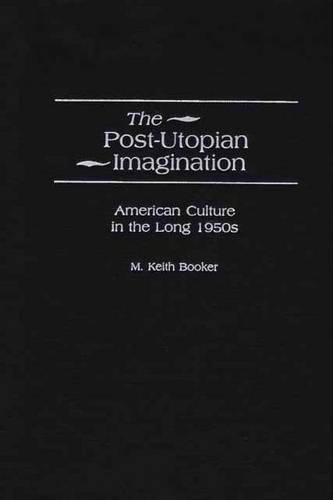
The Post-Utopian Imagination: American Culture in the Long 1950s
(Hardback)
Publishing Details
The Post-Utopian Imagination: American Culture in the Long 1950s
By (Author) M. Keith Booker
Bloomsbury Publishing PLC
Praeger Publishers Inc
30th January 2002
United States
Classifications
Tertiary Education
Non Fiction
Film history, theory or criticism
Literary studies: fiction, novelists and prose writers
Literary studies: c 1900 to c 2000
Cultural studies
791.43097309045
Physical Properties
Hardback
240
Description
Surveys a wide range of American literature and film of the long 1950s to show that the weak utopian vision of these works is related to the rise of late capitalism and postmodernism. In America, the long 1950s were marked by an intense skepticism toward utopian alternatives to the existing capitalist order. This skepticism was closely related to the climate of the Cold War, in which the demonization of socialism contributed to a dismissal of all alternatives to capitalism. This book studies how American novels and films of the long 1950s reflect the loss of the utopian imagination and mirror the growing concern that capitalism brought routinization, alienation, and other dehumanizing consequences. The volume relates the decline of the utopian vision to the rise of late capitalism, with its expanding globalization and consumerism, and to the beginnings of postmodernism. In addition to well-known literary novels, such as Nabokov's Lolita, Booker explores a large body of leftist fiction, popular novels, and the films of Alfred Hitchcock and Walt Disney. The book argues that while the canonical novels of the period employ a utopian aesthetic, that aesthetic tends to be very weak and is not reinforced by content. The leftist novels, on the other hand, employ a realist aesthetic but are utopian in their exploration of alternatives to capitalism. The study concludes that the utopian energies in cultural productions of the long 1950s are very weak, and that these works tend to dismiss utopian thinking as naive or even sinister. The weak utopianism in these works tends to be reflected in characteristics associated with postmodernism.
Reviews
.,."provides enlightening analyses of Vladimir Nabokov's Lolita and the films of Hitchcock and Disney...for graduate students and above..."-CHOICE
...provides enlightening analyses of Vladimir Nabokov's Lolita and the films of Hitchcock and Disney...for graduate students and above...-CHOICE
[B]ooker offers an impressive survey of 1950s culture, high and low, with special attention to how the "end of ideology" debate rippled through diverse realms of cultural production.-American Literature
[B]ooker's critical analysis of the long 50s is consistently engaging and provocative....[a]cutely perceptive and penetrating.-Utopian Studies
"Booker's critical analysis of the long 50s is consistently engaging and provocative....acutely perceptive and penetrating."-Utopian Studies
"Booker offers an impressive survey of 1950s culture, high and low, with special attention to how the "end of ideology" debate rippled through diverse realms of cultural production."-American Literature
..."provides enlightening analyses of Vladimir Nabokov's Lolita and the films of Hitchcock and Disney...for graduate students and above..."-CHOICE
"[B]ooker's critical analysis of the long 50s is consistently engaging and provocative....[a]cutely perceptive and penetrating."-Utopian Studies
"[B]ooker offers an impressive survey of 1950s culture, high and low, with special attention to how the "end of ideology" debate rippled through diverse realms of cultural production."-American Literature
Author Bio
M. Keith Booker is Professor of English at the University of Arkansas. He is the author of numerous articles and books on modern literature and theory, including Dystopian Literature: A Theory and Research Guide (Greenwood, 1994), Joyce, Bakhtin, and the Literary Tradition (1996), A Practical Introduction to Literary Theory and Criticism (1996), Colonial Power, Colonial Texts: India in the Modern British Novel (1997), The African Novel in English (Heinemann, 1998), The Modern British Novel of the Left (Greenwood, 1998), The Modern American Novel of the Left (Greenwood, 1999), Film and the American Left (Greenwood, 1999), Ulysses, Capitalism, and Colonialism (Greenwood, 2000), and Monsters, Mushroom Clouds, and the Cold War (Greenwood, 2001).
